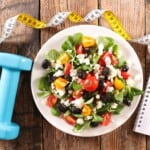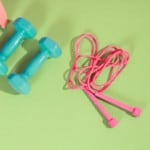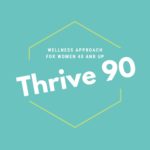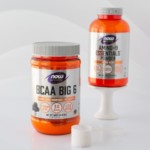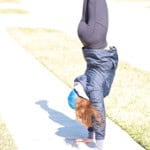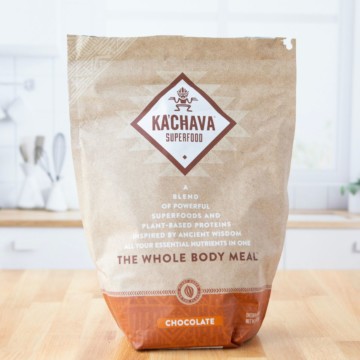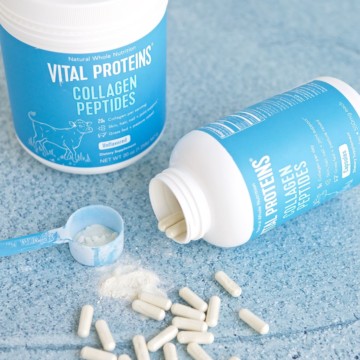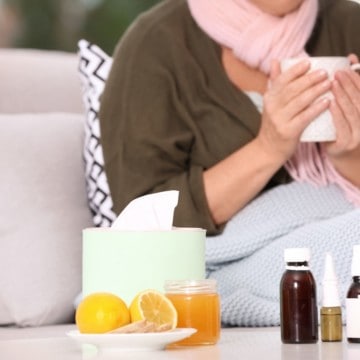
Of all the areas you can work on to have a healthier body, water intake may be the easiest place to start. What is not quite as easy to figure out is how much water to drink in a day. Here's the breakdown on why water is so important to health, how much water to drink in a day, how much water is too much, and how to work on drinking more water for proper hydration.
Jump to:
Health Benefits of Water
Water makes up about 60% of our body weight. It has a lot of really important roles like maintaining our body temperature, protecting and cushioning our organs and lubricating joints. Water aids in carrying nutrients & oxygen to provide energy throughout our bodies, fighting off infections, and getting rid of waste. Water is being used by so much of the human body on a regular basis. You have to drink it to replenish it.
Water is involved in several bodily functions but the connection between water and improving health is often less understood. Here are ways that hydration status is connected to wellness:
- Inadequate water intake can negatively impact mood and cognition. Specifically, it may cause headaches and fatigue that can result in poor concentration and mental execution (Source).
- Water makes up a large part of your blood volume. If you become dehydrated it can increase your blood pressure. This could have significant impacts on health by increasing your risk for heart disease (Source).
- A high fiber diet has a strong connection to better health, but without water, it can’t properly do its job. Water helps move fiber through the digestive tract and prevents constipation.
- Drinking enough water has the potential to aid in weight loss. Drinking water throughout the day increases the feeling of fullness. It has also been shown to decrease the amount of calories eaten during a meal. Drinking water may increase the amount of calories your body burns by aiding in the breakdown of fat (Source 1, Source 2, Source 3).
What impacts your water needs?
Your individual water needs are unique to you as there are several factors that will impact how much water your body needs.
Climate and physical living conditions.
If you live in a warmer climate,you likely sweat more and more often, thus increasing the amount of body water you lose on a daily basis. Colder climates also put you at risk for mild dehydration because the air is dryer causing your sweat to evaporate quicker, something you are probably not as in tune with. It also takes more water from your body to add moisture to the dry, cold air you breathe in your lungs. High altitudes may also increase your need to pee and decreases thirst sensation.
Health Status
When you are sick or fighting infection your body is using more fluids to fight the fever. In addition, you are probably hot from a fever and likely sweating (= more fluid losses). If you have had a period of vomiting or loose stools, you’ve also lost significantly more fluids.
There are some other unique conditions that may increase needs like bladder infections, constipation, pregnancy & breastfeeding, diabetes, and cystic fibrosis.
Some medical conditions that may decrease or limit needs include congestive heart failure and various stages of kidney disease.
Menstruation
Monthly menstruation cycles result in blood loss which contribute to total body fluid. Staying hydrated during your monthly period is important to replenish fluids as well as reduce bloating.
How much water to drink in a day?
This is a loaded question. Unfortunately there’s not a straight answer that fits everyone regarding daily water intake, like say protein or fiber needs. However, there are some minimum guidelines that have been set to keep you healthy, reduce fatigue, headaches, and other symptoms associated with dehydration.
The National Institutes of Health under the US Department of Health and Human Services recommends drinking 104-128 fl oz. (13-16 cups) of fluids per day for men and 72-96 fl oz. (9-12 cups) of fluids per day for women. This recommendation can serve as baseline goal for water intake and you may find you need more or less based on your personal needs.

How much water should you drink during exercise?
Physical activity, no matter the intensity, will increase your fluid needs. With an increased physical activity level water is crucial for lubricating joints, replenishing water lost through sweat, and transporting energy to your muscles.
The Academy of Nutrition and Dietetics has various recommendations for water consumption before, during and after exercise. To prevent a significant loss of water, before exercise drink 5-10 mL/kg of body weight 2-4 hours before exercise. For a 150 pound person this would be 340-681 mL or 11-23 ounces of water, 2-4 hours before exercise.
The amount of water to drink during exercise will depend on how much you sweat but a general rule is 0.4-0.8 L per hour of exercise or 13-27 oz per hour of exercise.
After exercise drink 1.25-1.5 L of fluid for every 1 kg of body weight lost or 42-50 oz. of fluid for every 1 kg of body weight lost.

Water will be sufficient to replenish fluid losses after exercise, however, if physical activities are longer than an hour and at high intensity, sports drinks may be needed to replace electrolyte losses as well.
How can you tell if you’re hydrated?
From the baseline recommendations listed above, it’s important that you experiment with total water intake to determine what is best for your body. Keep in mind all the circumstances mentioned earlier that increase needs like climate. Then, look out for these signs of dehydration to help you adjust your intake level.
- Dry skin, dry mouth, or tongue
- Infrequent urination
- Dark yellow or amber colored urine
- Constipation
- Increased thirst and hunger sensation
- Fatigue
- Headaches
- Nauseousness
- Moodiness
- Mental fatigue
To learn more about how dehydration can impact your mood and brain, read this post on Benefits of Drinking Water: Better Mood.
How much water is too much?
There is an idea floating around that you have to drink a gallon of water a day to be healthy, lose weight, be a better person...whatever. But is a full gallon of water a day too much?
One gallon of water is about 128 fl oz. (16 cups), which is the upper end of the recommendations for men. There is limited research supporting drinking a gallon of water every single day, so it may not be necessary unless a gallon of water is really what your body needs to stay adequately hydrated.
It’s also really important to understand that you can drink too much water. Water intoxication occurs when the sodium levels in your body are diluted by too much water and your kidneys cannot process the high volume of water you are drinking. However, the harm often does not come from the amount of water you drink but rather the short span of time large amounts of water are consumed. The kidneys can process up to 7 gallons (896 fl oz) of water a day but can only process about 27-33 fl oz (0.8-1 Liters of water) per hour. (source 1, source 2) Therefore it’s more important to drink water spread throughout the day than to guzzle a large volume of it in a short period of time (< 1 hour)
The 8 cups of water recommendation comes from being a reasonable recommendation that most people can do. Often times the day’s events may make us unaware of our thirst queues and we may forget to drink water. Drinking a glass of water 8 times a day does not guarantee you won’t be dehydrated. Instead, it may be a stepping stone to make you more aware of your water consumption throughout the day.
How to Drink More Water
Often times you may find yourself at the end of a busy day and realize the only thing you had to drink was coffee or a small amount of water. Making sure that you are staying hydrated throughout the day can be tough, especially if you don’t like water.
There are several water bottles on the market with the intentions to make drinking water more appealing and be set as a “reminder” to drink water. The best water bottle is the one you'll actually use. “By the hour water bottles” have little bullet points along the bottle with different times to serve as goals or reminders to drink that set amount of water by that time of day. Other bottles have different style lids, straws, and mouthpieces making it easier to drink from.
My Favorite Water Bottles
Personally, I love water bottles with some sort of leak proof straw option. The leakproof option is necessary because I drop or tip my bottle of water all the time. Straws help prevent me from spilling water on myself while drinking, which unfortunately, is a problem I battle daily. Here's a few of my favorite water bottles and ones that I think promote more drinking (of water):
- Best leak proof straw options: Contigo Autospout Ashland Bottle
- Best stainless steel water bottles with 3 types of lids included: Iron Flask Sports Bottle
- Coolest techy bottle that lights up to remind you to drink with free tracking app: Hidrate Spark 3 Smart Water Bottle
- Small size and not intimidating water bottle: S'well 9 oz stainless steel bottle
There are several smartphone apps that remind you to drink water as well as track your water intake for the day to see how much you are drinking over time. Some apps that may be useful are “Daily Water Tracker Reminder”, “WaterMinder”, and “Aqualert:Water Tracker Daily”. Or simply setting timers on your cell phone or watch throughout the day reminding you to drink water until it becomes more habitual.
Flavored Waters
If after trying these tips, you’re still struggling to drink enough water, it might lead you to consider drinking other fluids that are well, just more fun to drink. This category includes sparkling water, flavored waters, diet drinks, coffee, and regularly sweetened drinks.
Sparkling water or flavored seltzers are just as hydrating as plain water and are safe to consume. (Source)
Flavored waters and diet drinks contain sugar alternatives to give them a sweeter more appealing taste than water. Sugar substitutes are generally recognized as safe. However, I think it’s important to be aware of how much you are consuming. When consumed in excess, artificial sweeteners may cause diarrhea. They also come with the risk of altering your taste receptors to desire sweeter foods and find less sweet foods like fresh fruit and vegetables, less appealing. (Source) Generally speaking, I think reducing your intake of artificial sweeteners is a good idea. Personally I think erythritol and stevia are the best choices for no/low calorie sweeteners.
Coffee and Tea
Caffeinated coffee and tea can offer the same hydration benefits of water. However, you should not rely on a cup of coffee or tea as your sole beverage throughout the day. Caffeine, and specifically coffee, has been thought to be a mild diuretic, meaning it increases urination. However, research has shown it has a very minor impact, if at all, especially for those who drink coffee regularly (Source).
Sugar sweetened drinks are non-diet sodas, juices, sports drinks, sweet tea, lemonade, or coffee drinks. These sugary drinks can contribute to hydration but they can also cause you to take in too many calories. They could have the same amount of calories as a meal without the ability to fill you up or provide nutritional value (Source).
How are you doing with water?
Now it's time to check in with how you are doing in the water department. Write down about how many glasses of water you have already had today and continue to do so for the rest of the day. Then, note any signs mentioned above that might signify you are not meeting your hydration needs.
If you need some help increasing your daily fluid intake, try out one of the fun bottles I shared above or use an app or tracker to remind you. Suggest to a friend that you have a friendly water challenge to encourage each other. For those who like to live off coffee, energy drinks, or diet sodas throughout the day, start by alternating between one of those and a cup of water.

